
Britain desperately needs leadership and vision and the post-war, reforming Prime Minister Clement Attlee should be the inspiration.

The opposition to Brexit spends too much time talking about Brexit. We need to address, head on, the social crises which underlay the vote in the swathes of Britain that have been badly left behind by globalisation, modernisation and the 2008 financial crash.
We need to champion reform as radical as Brexit itself, so that a large portion of 52% of the nation no longer falls for the Farage lie that Europe and foreigners are to blame for their plight.
In short, we need Attlee 2.0 – a 2020 version of the great post-war reforming government under Clement Attlee which, after Churchill won the war, tackled the crisis of reconstruction and endemic poverty, while being resolutely internationalist and engaged abroad.
The first essential is to understand Attlee and his legacy. ‘Major Attlee’, old boy of Haileybury, a Hertfordshire public school originally founded by the East India Company to train its administrators, had no truck with the Labour tradition of pacificism and isolationism which held sway after the outbreak of the First World War and provided two of the party’s inter-war leaders, Ramsay MacDonald and George Lansbury.

Attlee was internationalist to the bone and respected Churchill not only in the Second World War – he was Deputy Prime Minister throughout the coalition government – but right back to the First World War when he supported Churchill’s strategic daring in seeking to bring an early end to the conflict with the Dardanelles campaign.
For Attlee, Britain had to be internationally strong and engaged so it could deliver for working people at home and abroad. He was no imperialist or jingoist. ‘I often asked the men what they were fighting for?’ he said on Armistice Day 1920. ‘I always got the same answer: they were fighting for something far bigger than King or Country. They believed, and we believed, that they were fighting for the good of the whole world.’
After 1918 Attlee strongly supported Woodrow Wilson’s Fourteen Points and the League of Nations. After 1945 he championed the United Nations, the International Labour Organisation and NATO. He was sceptical of the sketchy early French ideas for European union, but it is unthinkable that a modern Attlee would have pulled Britain out of an established European system of trade and treaties of co-operation.
Next year, 2019, is the centenary of Attlee becoming mayor of the chronically deprived east London borough of Stepney, the vital prelude to his election as MP for Limehouse in 1922.
Attlee’s mayoralty of Stepney was as important for British politics and social reform as Jo Chamberlain’s service as Mayor of Birmingham in the previous Gladstonian era. It inspired his agenda for radical but practical reform, directed at the needs of communities he knew intimately.
In a rare flight of rhetoric, Mayor Attlee lambasted the ‘great betrayal’ of Lloyd George’s post-war coalition with the Conservatives, in breaking the promises to provide the ‘homes fit for heroes’ promised by the Welsh Wizard personally at the end of the war. In 1945, Attlee was determined that, however great the international pressures, there would be no repeat: the promises of Labour’s manifesto – ‘Face the Future’ – would be delivered. And they were.
Stepney taught Attlee that local, community action was as important – and as vital a source of innovation and democratic engagement – as government from Westminster and Whitehall. In 1919 Stepney, 80% of residents were classed as ‘very poor’ and there were a staggering 80,000 unemployed – a 1920s version of today’s Blackpool. Attlee promoted policies which, as the local paper put it, ‘do not err on the side of modesty’. He argued for municipalisation of food supplies, street markets, cinemas, and the building of new roads, public libraries, art galleries, and museums.
Mayor Attlee soon had a record of achievement, despite the ‘Tory austerity’ of Lloyd George’s coalition at national level. He built five prenatal and child welfare clinics, appointed professional health visitors, and provided free milk for more than 6,000 families. Regular rubbish collection was instituted, slum landlords taken to court, pay increased for council workers, labour exchanges promoted, and a programme of new and expanded improved roads and public libraries carried through.
Attlee’s Stepney experience infused his book The Socialist Worker, published in 1920, which his latest biographer John Bew calls ‘the forgotten script of the 20th century Labour party… principled, pluralistic, and humane’. Reading it today, I am struck by the parallels with George Orwell: the same clear, understated, unembellished prose drawing on harrowing social conditions, a kind of ‘homage to the East End’.
In the book Attlee set out three developments that had, in his view, transformed British politics and shaped the contemporary social crisis. First, a recognition, dating back to the Boer War (1899-1902), that social conditions among the poor were shocking and undermining ‘national efficiency’. The Victorian political economy, which held that the state should not interfere in social questions, was inhumane, inflexible, outdated and had to change. The early agent of that change was Lloyd George, the great Chancellor under Asquith from 1908, who took on the House of Lords and advanced pensions and social insurance. But bolder action was now required.
For Lloyd George read Blair and Brown: a record of creditable reform, but not enough, and far more, and more radical, is now required.
Attlee’s second key development was the demand for more democracy after the First World War. The 1918 Representation of the People Act tripled the electorate so that the poor were no longer ‘an inert mass on which the kindly disposed may exert moral or material pressure, or mould to their own liking’. Women got the vote for the first time, after decades of argument dating back to John Stuart Mill’s advocacy in the 1860s.
More democracy is equally vital now. Immediately, the people need to be engaged in the single most important decision of the country in the next 18 months: whether or not to leave the European Union on the Tories’ terms. But democracy, particularly at the local level, needs to deliver far more – today’s equivalent of the ‘homes for heroes’ which Attlee’s 1945 government did deliver.
The new generation of city mayors in the Midlands and the North are especially critical: political leaders with strong mandates to tackle the deep crisis in many of the communities most left behind in recent decades, and which needs more and better jobs, schools, infrastructure, public services and apprenticeships and successful career paths for those not going to university.
Andy Burnham in Manchester, and Andy Street in Birmingham, are the Mayors Attlee and Chamberlain of the modern era, every bit as important as secretaries of state for this and that in London. And they need the tools for the job.
Attlee’s third development was ‘active citizenship’. In the war, he argued, every citizen had been asked to make sacrifices for the community, and it was no longer acceptable to argue that citizenship was passive or dormant except in times of crisis. Rights and duties went hand in hand. For Attlee, there was no morality in a ‘hand-out society’: but none either in a do-nothing state or community which failed to provide essential opportunities in the first place.
The Socialist Worker is a manifesto equally for the Mayor of Stepney in 1919, the Labour Prime Minister of 1945 – and in many ways the radical Prime Minister we need now, building a better NHS and education system, a new Beveridge, a new generation of new towns and ‘homes fit for heroes’, and bottom-up community regeneration community by community, town by town, city by city. A new Attlee can rebuild Britain – as part of a flourishing European Union.
• Andrew Adonis is a former Transport Secretary and Minister for Schools. He resigned as Chair of the National Infrastructure Commission last week to fight Brexit and was branded a ‘twisting weasel’ by Nigel Farage for calling for a referendum on the final terms of Britain’s proposed departure from the European Union









